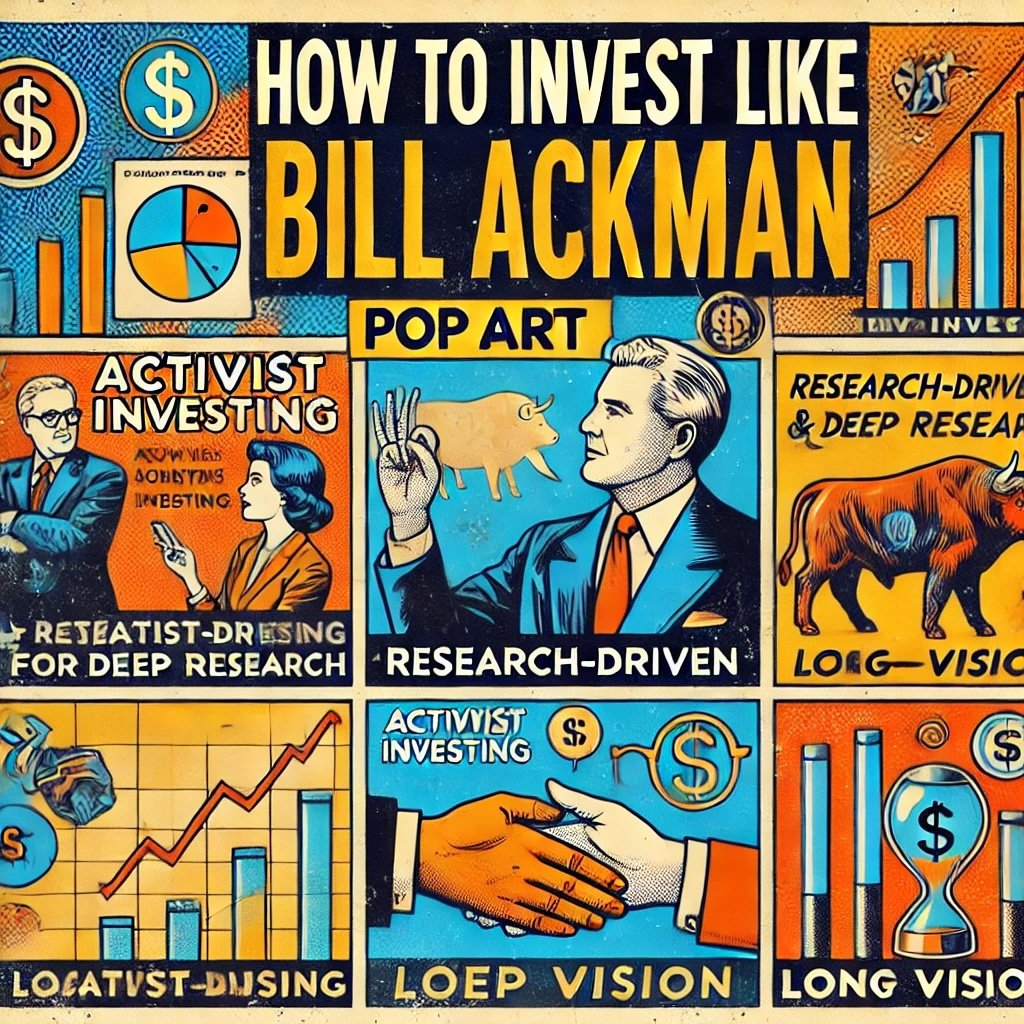In the late 1980s, Japan experienced one of the most notorious housing bubbles in history. Fueled by a combination of easy credit, speculative investments, and soaring property values, this bubble led to a dramatic rise in real estate prices, particularly in urban areas like Tokyo. At its peak, the land beneath the Imperial Palace in Tokyo was said to be worth more than all the real estate in California combined. However, this meteoric rise in property values was unsustainable, and by the early 1990s, the bubble had burst, leading to a prolonged period of economic stagnation often referred to as Japan’s “Lost Decade.” The effects of this burst were felt across the country, leaving a lasting impact on the economy, society, and corporate sector.
source: Polymatter on YouTube
Overview of Japan’s Housing Bubble
Japan’s corporate culture played a significant role in both the creation and the eventual bursting of the housing bubble. At the heart of this culture was the concept of lifetime employment, where employees were expected to remain loyal to a single company throughout their careers. This system fostered deep company loyalty and a sense of stability, as workers were rewarded with job security and a structured career path. Hierarchy was another key element, with decisions often made through a consensus-driven process within clearly defined ranks. This approach to corporate life created a work environment that was highly risk-averse, yet paradoxically, it also led to speculative behavior when it came to real estate investments.

The intertwining of corporate culture with economic behavior during this period is crucial to understanding how Japan’s housing bubble came to be. The focus on stability and loyalty within companies influenced both corporate and individual decisions, leading to widespread speculative investments in real estate as a means of securing wealth and status. As a result, Japan’s corporate culture didn’t just passively observe the bubble—it actively participated in its growth and, ultimately, its downfall.
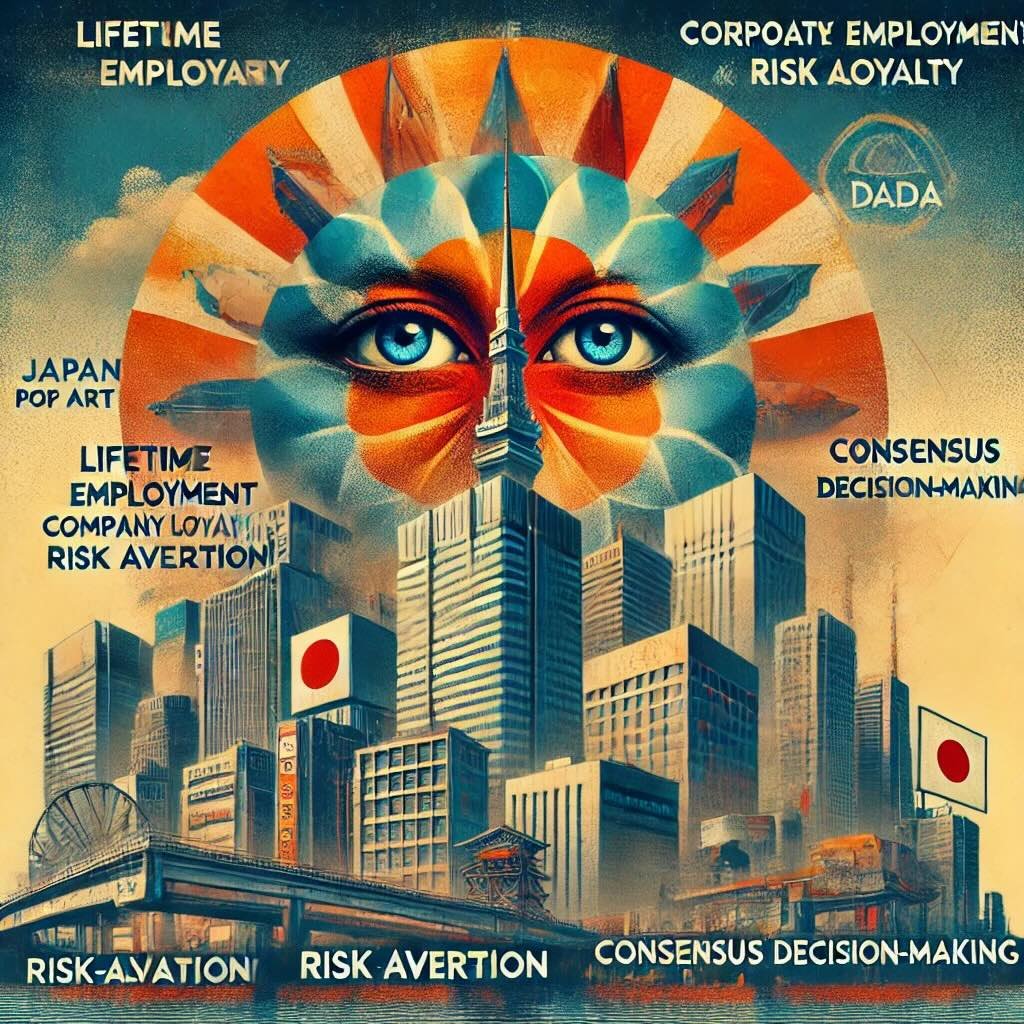
Japan’s Corporate Culture: An Overview
Lifetime Employment
One of the cornerstones of Japan’s corporate culture has long been the concept of lifetime employment. This system, where employees are hired with the expectation that they will remain with the same company until retirement, created a sense of unparalleled job security. In exchange for their unwavering loyalty, workers were promised stability and a clear career path. This environment fostered a strong bond between employees and their employers, where the company wasn’t just a place to work—it was an integral part of one’s identity. This sense of security translated into financial stability, allowing employees to make long-term financial commitments, such as purchasing homes. However, this stability also contributed to a mindset that prioritized maintaining the status quo over embracing change, which played a significant role in the dynamics of Japan’s housing bubble.
Company Loyalty
Deep-rooted loyalty to one’s company was another defining feature of Japanese corporate culture. In Japan, loyalty to the company often extended beyond the office walls; it was a social contract that governed much of an employee’s life. This loyalty wasn’t just about job security—it was about pride and identity. Employees took great pride in the success of their companies, and in turn, companies were expected to take care of their workers. This mutual dependency created a corporate environment where the success of the company was intrinsically linked to the well-being of its employees. However, this loyalty also had its downsides. It often led to groupthink and a reluctance to question decisions from above, even when those decisions involved risky financial practices, such as speculative real estate investments.
Risk Aversion and Consensus Decision-Making
In Japan’s corporate culture, risk aversion was a deeply ingrained trait. Avoiding risk was not just a strategy—it was a guiding principle. Companies were traditionally cautious, preferring steady, incremental progress over bold, uncertain moves. This risk aversion was closely tied to the consensus-driven decision-making process that dominated Japanese workplaces. Decisions were rarely made unilaterally; instead, they were the result of lengthy discussions and careful consideration among all relevant parties. While this approach minimized the likelihood of hasty or reckless decisions, it also slowed down the decision-making process and often led to conservative choices. In the context of the housing bubble, this risk aversion paradoxically contributed to a collective sense of security around real estate investments, as companies and employees alike followed the crowd, convinced that the consensus couldn’t be wrong.
Workplace Hierarchies
Hierarchical structures played a crucial role in shaping Japan’s corporate culture. The workplace was often a mirror of Japan’s broader societal hierarchies, with clear lines of authority and respect for seniority. These hierarchies dictated not only the flow of information but also the speed and direction of decision-making. In such a structure, lower-level employees were expected to defer to their superiors, often leading to a top-down approach in both daily operations and strategic decisions. This deference to authority meant that once a decision—like heavily investing in real estate—was made at the top, it was rarely questioned or challenged at the lower levels. As a result, the hierarchical nature of Japanese companies contributed to the rapid escalation of real estate investments during the bubble, as employees followed the lead of their superiors, often without fully understanding the risks involved.
Together, these elements of Japan’s corporate culture—lifetime employment, deep company loyalty, risk aversion coupled with consensus decision-making, and hierarchical structures—created a unique environment that shaped economic behavior during the housing bubble. Understanding these cultural dynamics is key to grasping how the bubble formed and why its effects were so profound.
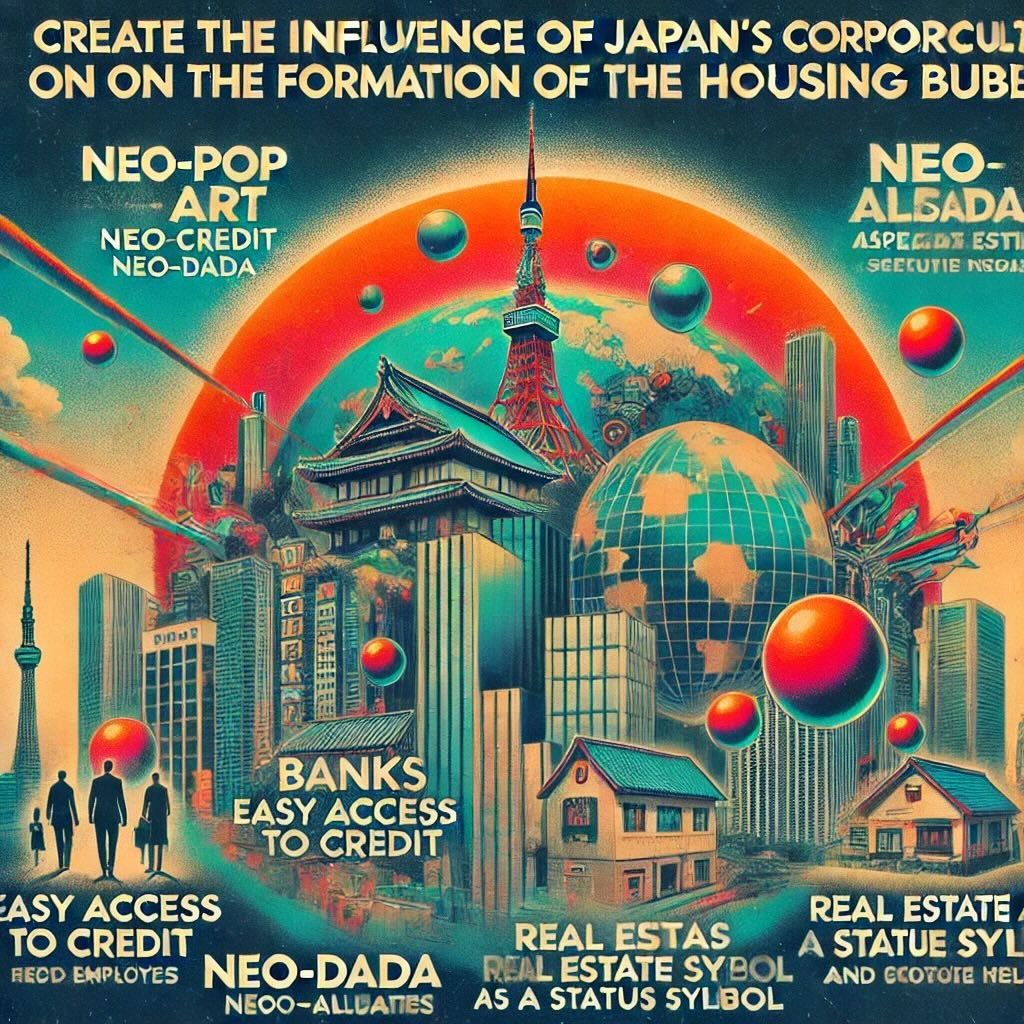
Corporate Culture and the Housing Bubble Formation
Easy Access to Credit
Japan’s corporate culture significantly influenced the financial landscape during the housing bubble, particularly in terms of access to credit. In a society where lifetime employment and corporate loyalty were paramount, banks and corporations operated in a tightly knit ecosystem. Banks were more than just financial institutions; they were key players in a web of corporate alliances, known as keiretsu, which intertwined companies with their lenders. This close relationship made it easier for employees and corporations to obtain credit, often with minimal scrutiny. The trust inherent in these relationships meant that credit was extended not just based on financial metrics, but also on the strength of corporate ties and the expectation of job security. Employees, assured of their stable incomes, and corporations, confident in their long-term success, found it relatively simple to secure loans, which they often invested in real estate. This easy access to credit played a crucial role in fueling the housing bubble, as more and more money poured into an already overheated market.
Speculative Investments
The promise of job security and the deep-seated loyalty to companies created an environment ripe for speculative investments. Employees, buoyed by their stable employment and encouraged by the company’s success, were more willing to take financial risks. Real estate, seen as a safe and lucrative investment, became the preferred choice for many. Corporations, too, driven by the same cultural forces, engaged in speculative real estate investments, often leveraging their assets to acquire more property. The belief that real estate values would continue to rise indefinitely led to a collective frenzy, where both individuals and companies invested heavily in property, pushing prices to unsustainable levels. This speculative behavior, deeply rooted in corporate culture, was a key driver of the housing bubble, as it created a cycle of ever-increasing property values fueled by optimism and the pursuit of status.
Real Estate as a Status Symbol
In Japan’s corporate culture, real estate ownership was more than just an investment—it was a status symbol. Owning property, especially in prime urban locations, was seen as a mark of success and stability, both for individuals and for companies. For employees, buying a home was often viewed as a milestone that signaled financial security and personal achievement. For corporations, owning prestigious real estate properties bolstered their image and demonstrated their financial strength. This cultural emphasis on property ownership as a symbol of status further fueled the housing bubble. As more people and companies sought to elevate their status through real estate investments, demand skyrocketed, driving prices higher and higher. The pursuit of status through property ownership became a powerful force in the market, inflating the bubble to dangerous levels.
Corporate Real Estate Holdings
Corporations themselves were significant players in the real estate market during the bubble. Many companies, flush with cash from Japan’s economic boom, began investing heavily in real estate, often acquiring large portfolios of properties. These investments were not just about financial returns; they were also about corporate prestige and influence. Owning high-profile properties in major cities like Tokyo was seen as a way to solidify a company’s position and reputation. However, this heavy investment in real estate by corporations contributed to the inflation of property values. As more companies entered the market, competing for the most desirable properties, prices continued to rise, creating a feedback loop that further inflated the bubble. When the bubble eventually burst, these corporate real estate holdings turned from valuable assets into significant liabilities, contributing to the financial difficulties that many companies faced in the aftermath.
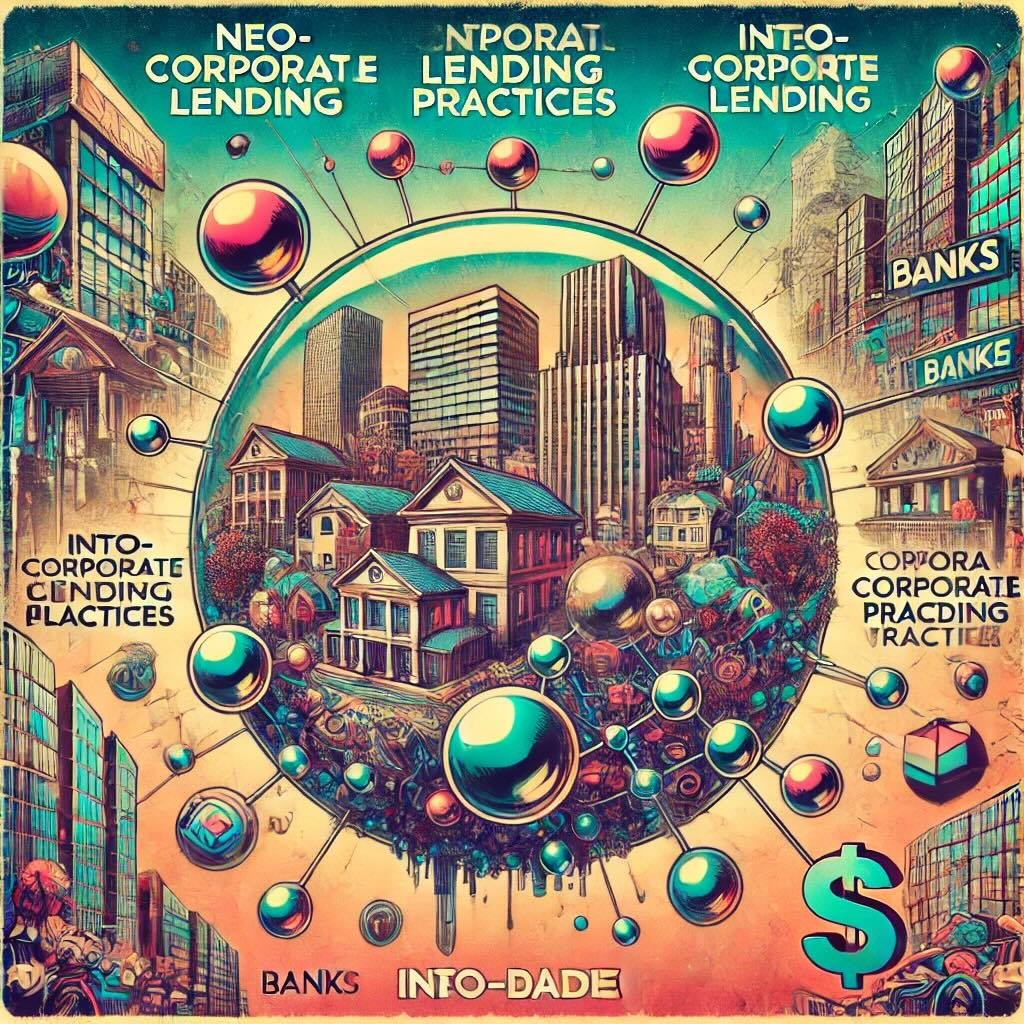
The Role of Corporate Lending Practices
Inter-Corporate Lending
During Japan’s economic boom leading up to the housing bubble, inter-corporate lending became a widespread practice. Companies, flush with cash from their booming businesses, began to lend to one another, creating a complex web of financial relationships. Often, these loans were secured using real estate as collateral, further tying corporate fortunes to the overheated property market. This practice was not just about financial gain; it was also a reflection of the close-knit nature of Japanese corporate culture, where companies within the same keiretsu (business groups) supported one another’s growth. However, this mutual lending, while fostering growth and expansion in the short term, also meant that companies were increasingly interconnected, with their financial health closely tied to the value of their real estate holdings. As property values soared, so did the amount of inter-corporate debt, setting the stage for widespread financial instability when the bubble eventually burst.
Banks’ Relationship with Corporations
The relationship between banks and corporations in Japan during this period was symbiotic, yet dangerously close. Japanese banks, often part of the same keiretsu as the corporations they served, extended generous loans to companies, fueled by the belief that these firms were low-risk due to their stable, long-term growth prospects. This close relationship fostered a lending environment where risk was often overlooked or underappreciated. Banks were eager to lend, and companies were just as eager to borrow, particularly for real estate investments. The reliance on real estate as collateral became a double-edged sword—while it allowed companies to access significant amounts of capital, it also meant that their debts were heavily tied to volatile property values. As the bubble grew, banks continued to lend, often without fully considering the potential risks of a downturn, leading to a dangerous level of over-leveraging across the corporate sector.
Bubble Expansion through Corporate Networks
The combination of inter-corporate lending and the close ties between banks and corporations created a perfect storm for the rapid expansion of the housing bubble. As companies borrowed heavily to invest in real estate, they inflated property values, which in turn increased the perceived value of the collateral backing their loans. This feedback loop led to even more lending, as banks felt confident extending credit based on the ever-rising property prices. Corporate networks, especially those within the same keiretsu, reinforced this cycle, as companies encouraged one another to participate in the booming real estate market. The interconnected nature of these corporate networks meant that the bubble was not confined to isolated sectors—it spread throughout the entire economy, with real estate at its core. When the bubble eventually burst, the consequences were devastating, not just for individual companies, but for the entire Japanese economy, as the intricate web of corporate lending and over-leveraging unraveled.

The Burst of the Bubble and Corporate Culture’s Impact
Impact on Corporations
When Japan’s housing bubble burst in the early 1990s, the consequences for corporations were swift and severe. Many companies that had heavily invested in real estate suddenly found their assets plummeting in value. These once-valued properties, which had been seen as solid investments, quickly became financial albatrosses. Corporations that had leveraged themselves to the hilt, betting on the ever-rising real estate market, were now faced with massive losses. The collapse of property values not only wiped out expected profits but also triggered a cascade of financial problems. For some companies, the losses were so significant that they led to bankruptcy, while others were forced into drastic restructuring efforts to survive. The burst of the bubble exposed the dangers of the speculative investments that had been fueled by Japan’s corporate culture, showing just how vulnerable these companies had become.
Financial Instability
The long-term effects of the bubble’s burst on corporate financial stability were profound. Companies that had once been pillars of Japan’s economy found themselves struggling to stay afloat. The over-leveraging that had seemed like a smart financial strategy in the booming 1980s now became a liability. Corporate debt levels soared as the value of collateral plummeted, leading to a credit crunch that made it difficult for even financially sound companies to secure funding. The banking sector, deeply intertwined with corporate Japan, was also hit hard, with a wave of bad loans leading to a broader financial crisis. Many companies were forced into painful restructuring, cutting costs, selling off assets, and laying off workers to stabilize their finances. This period of financial instability, often referred to as Japan’s “Lost Decade,” had lasting repercussions, fundamentally altering the landscape of Japanese business.
Employee Impact
The burst of the bubble didn’t just affect corporations; it had a significant impact on employees as well. For many workers, the promise of lifetime employment and financial security was shattered. Employees who had invested heavily in real estate during the boom years saw their personal finances take a devastating hit as property values plummeted. For those employed by over-leveraged companies, the situation was even more dire. Job security, once a cornerstone of Japanese corporate culture, became uncertain as companies downsized, restructured, or went bankrupt. The ripple effects of the bubble’s burst were felt throughout society, with rising unemployment, wage stagnation, and a growing sense of economic insecurity. The cultural fabric of corporate Japan, which had once been so tightly woven around the concepts of loyalty and stability, began to fray, leading to a period of introspection and change.
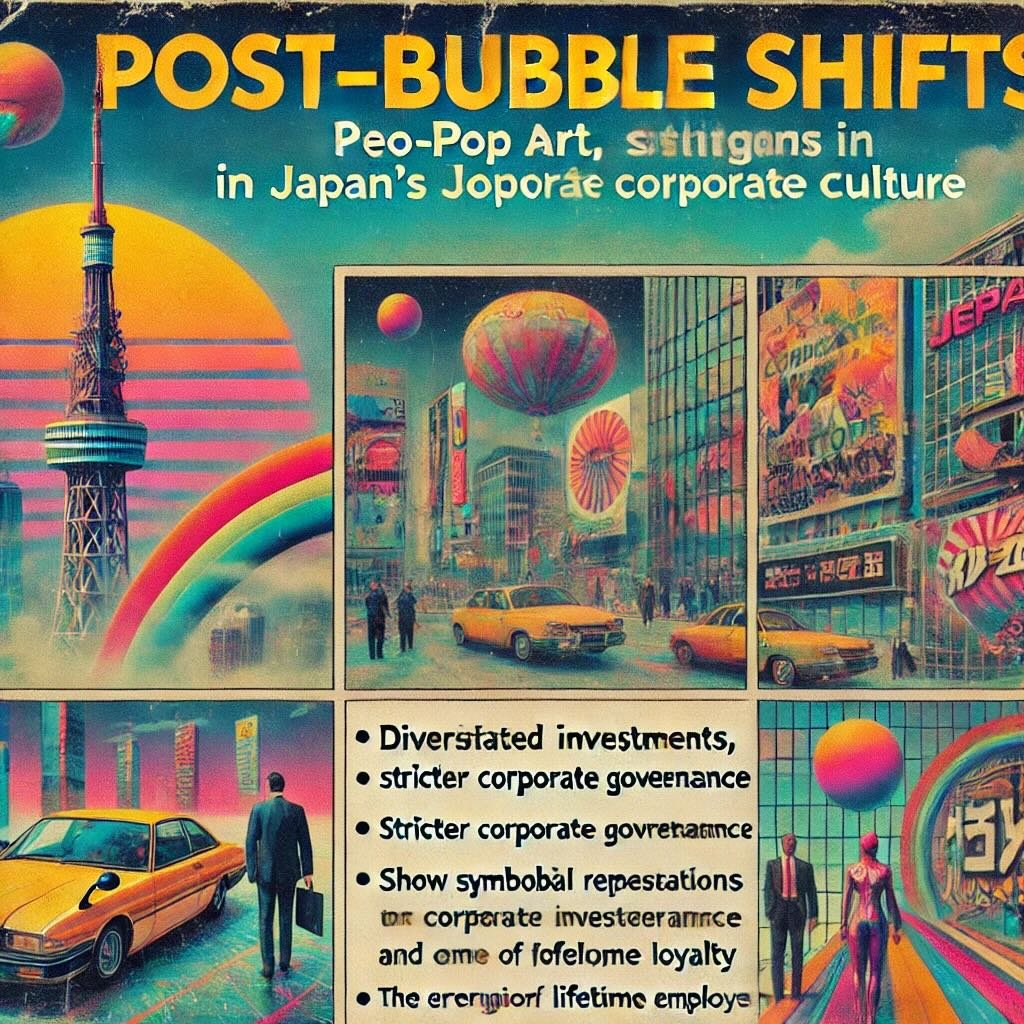
Post-Bubble Corporate Culture Shifts
Shift in Corporate Investment Strategies
In the aftermath of the bubble, Japanese corporations underwent a significant shift in their investment strategies. The speculative frenzy that had characterized the 1980s was replaced by a more cautious and measured approach. Companies began to distance themselves from the real estate market, which had once been seen as a surefire path to wealth but had proven to be a financial quagmire. Instead of pouring money into property, corporations started to diversify their investments, focusing on areas such as technology, international expansion, and innovation. This move away from speculative real estate marked a turning point in Japan’s corporate culture, signaling a newfound emphasis on sustainability and long-term growth. The painful lessons learned from the bubble made companies more risk-averse, prioritizing stability over the high-risk, high-reward ventures that had previously driven the market.
Changes in Corporate Governance
The collapse of the bubble also sparked significant changes in corporate governance. The financial turmoil revealed deep flaws in the way companies were managed, particularly in terms of risk oversight and decision-making. In response, many Japanese corporations began to overhaul their governance structures, introducing stricter controls and more transparent practices. Boards of directors became more involved in the strategic direction of companies, with a greater focus on accountability and risk management. This shift was also driven by pressure from investors, both domestic and international, who demanded more prudent management practices to protect their investments. The result was a gradual transformation of corporate Japan, where the once-prevalent culture of consensus-driven, hierarchical decision-making started to give way to a more balanced and responsible approach. This period saw the emergence of corporate governance codes and the adoption of international best practices, further aligning Japanese companies with global standards.
Employee Loyalty and Job Security
Perhaps one of the most profound shifts post-bubble was in the realm of employee loyalty and job security. The traditional model of lifetime employment, which had been a cornerstone of Japan’s corporate culture, began to unravel. As companies faced financial pressures, the promise of job security became increasingly difficult to uphold. Layoffs, once a rare occurrence in Japan, became more common as corporations struggled to cut costs and restructure their operations. This shift had a lasting impact on employee loyalty. Workers, who had once been fiercely loyal to their employers, began to view their jobs with a more pragmatic lens, recognizing that their positions were not as secure as they had once believed. The dissolution of the lifetime employment model led to a more flexible labor market, with employees becoming more mobile and companies adopting more performance-based employment practices. While this transition was challenging, it also laid the groundwork for a more dynamic and competitive corporate environment in Japan.
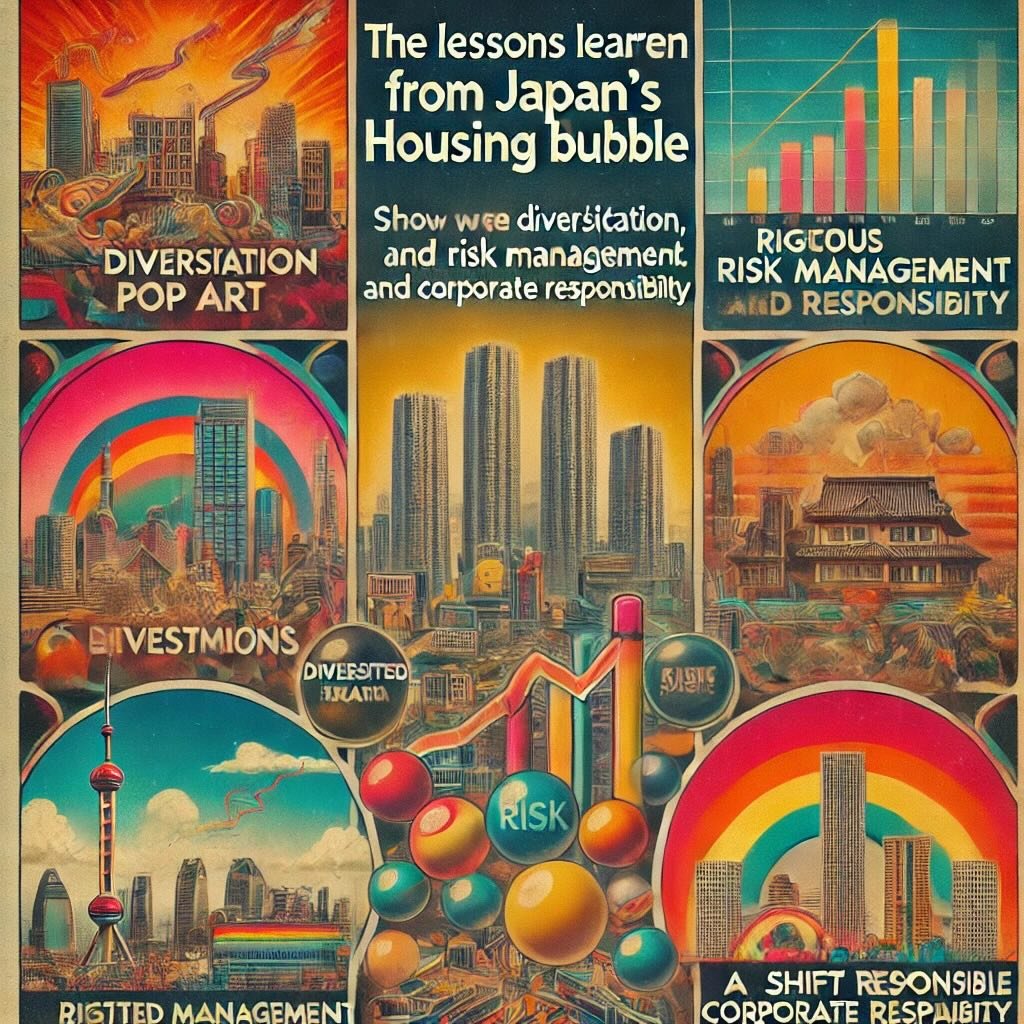
Lessons Learned
Need for Diversification
One of the most significant lessons to emerge from Japan’s housing bubble is the critical importance of diversification in corporate investment strategies. During the bubble, many companies placed a disproportionate amount of their assets in real estate, lured by the seemingly endless upward trajectory of property values. This overreliance on a single asset class proved disastrous when the bubble burst, leaving companies exposed to massive losses. The fallout underscored the dangers of putting all eggs in one basket, prompting a reevaluation of investment practices. In the years that followed, Japanese corporations began to adopt a more diversified approach, spreading their investments across different sectors and geographic regions. This strategy not only mitigates risk but also positions companies to take advantage of growth opportunities in a variety of markets. Diversification, it turns out, is not just a financial buzzword but a fundamental principle that can protect against the volatility of any single market.
Risk Management
The bubble’s collapse also brought the issue of risk management into sharp focus. The speculative fervor of the 1980s, coupled with lax lending practices and a lack of oversight, created a perfect storm that ultimately led to the bubble’s burst. In the aftermath, it became clear that better risk management practices were needed to prevent such a scenario from happening again. Corporations began to implement more rigorous risk assessments, evaluating potential investments with a greater emphasis on long-term sustainability rather than short-term gains. This shift towards a more cautious and calculated approach was not just about protecting individual companies but also about safeguarding the broader economy from the ripple effects of another speculative bubble. By prioritizing risk management, Japanese corporations have been able to build more resilient business models, better equipped to navigate economic uncertainties.
Corporate Responsibility
Perhaps one of the most profound lessons learned from the housing bubble is the importance of corporate responsibility. During the bubble years, the focus was largely on profit maximization, often at the expense of broader economic stability. Companies invested heavily in real estate, driving up property prices to unsustainable levels and contributing to an economic environment fraught with risk. When the bubble burst, the consequences were felt not just by the corporations themselves but by the entire country, leading to widespread financial hardship. This experience highlighted the need for corporations to consider the broader economic impacts of their investment decisions. Corporate responsibility is not just about complying with regulations or engaging in philanthropy; it’s about making decisions that contribute to the long-term health of the economy and society. By adopting a more responsible approach, companies can play a key role in fostering sustainable economic growth, avoiding the pitfalls of the past, and ensuring that their actions contribute positively to the wider community.
12-Question FAQ: The Influence of Japan’s Corporate Culture on its Housing Bubble
1) How did Japan’s corporate culture help inflate the housing bubble?
A blend of lifetime employment, keiretsu/main-bank ties, consensus decision-making, and status signaling via land encouraged firms and households to lever up into real estate, reinforcing a belief that land prices “only go up.”
2) What is lifetime employment and why did it matter?
Lifetime employment promised job security and steady pay growth. That stability lowered perceived risk, making households and firms more comfortable taking large property loans and multi-decade commitments.
3) How did keiretsu and main-bank relationships affect credit?
Close corporate–bank networks prioritized relationship lending. With land as collateral and rising appraisals, banks expanded credit readily, recycling gains into further property purchases—classic pro-cyclical leverage.
4) Why did consensus decision-making amplify real-estate bets?
Consensus reduced dissent and groupthink took hold. Once property became the “safe” corporate play, few voices challenged it; committees ratified similar strategies across firms, synchronizing the upswing.
5) In what ways was real estate a status symbol for companies and workers?
Prime addresses and landmark buildings signaled prestige and power for corporations; owning a home in top school or commuter zones conferred middle-class status for employees—both motives inflated demand.
6) Did corporate balance sheets directly fuel the bubble?
Yes. Many firms booked and pledged land at rising values, used it to secure more loans, and diversified into property subsidiaries. Gains on paper helped justify further expansion, tightening the price-credit loop.
7) How did inter-corporate lending and cross-shareholding play a role?
Within groups, companies lent to affiliates and held each other’s equity. The web of exposures spread property-linked risk through corporate networks, magnifying the impact when asset values turned.
8) What changed when the bubble burst?
Collateral values collapsed, turning loans non-performing. Firms faced write-downs, fire-sales, hiring freezes, and restructurings; banks carried bad debts, triggering a long credit clean-up and the “Lost Decade.”
9) How were employees affected after the crash?
The strain on employers weakened the lifetime employment norm: promotions slowed, bonuses shrank, mid-career layoffs rose in some sectors, and households with high LTV mortgages faced negative equity.
10) Which governance and strategy shifts followed?
Companies adopted tighter risk controls, trimmed property exposure, improved disclosure and board oversight, and reoriented toward productivity, exports, and technology rather than speculative land holdings.
11) What are the main lessons for today’s corporates and policymakers?
Don’t anchor on rising collateral; stress-test for price shocks.
Avoid herd behavior; empower independent risk voices.
Limit concentration: diversify assets and funding.
Align incentives so prestige projects can’t override return on capital.
12) Could similar cultural drivers inflate bubbles elsewhere?
Yes. Any system with relationship lending, implicit job or income guarantees, status-seeking via property, and consensus-driven groupthink can reproduce the same leverage and feedback dynamics.

Conclusion
The story of Japan’s housing bubble is deeply intertwined with the country’s unique corporate culture. From the lifetime employment model and deep-seated company loyalty to speculative real estate investments and risky lending practices, the influence of corporate culture was undeniable. These cultural factors not only fueled the rapid rise in property values but also played a pivotal role in the bubble’s dramatic burst. Corporations, driven by a mix of security and ambition, made decisions that led to overleveraging and speculative fervor, which ultimately proved unsustainable. The aftermath of the bubble revealed the vulnerabilities inherent in this approach, leading to widespread financial instability and a fundamental shift in how Japanese businesses operate.
Reflection on Corporate Culture
The burst of the housing bubble left an indelible mark on Japan’s corporate culture, forcing a reevaluation of long-held beliefs and practices. The traditional focus on job security and corporate loyalty, while beneficial in many ways, also contributed to the risk-taking behavior that inflated the bubble. In the years that followed, there was a noticeable shift towards more cautious and diversified investment strategies, with a greater emphasis on risk management and corporate governance. These changes reflect a broader transformation in Japan’s economic landscape, where the lessons of the past continue to shape the present. The experience highlighted the need for a balance between ambition and prudence, reminding companies that sustainability should be at the heart of their decision-making processes.
Final Thoughts
Understanding the influence of corporate culture on economic events like Japan’s housing bubble is crucial for preventing similar crises in the future. Culture, while often seen as a soft factor, can have hard consequences when it drives business decisions on a national scale. By examining the interplay between corporate values and economic outcomes, we can gain valuable insights into the risks and opportunities that lie ahead. For Japan, the bubble served as a painful but necessary lesson, one that has led to a more resilient and responsible approach to business. As the global economy continues to evolve, the importance of aligning corporate culture with sustainable practices cannot be overstated. Learning from the past ensures that we are better prepared for the challenges of the future, avoiding the mistakes that led to such profound economic disruption.
Important Information
Comprehensive Investment, Content, Legal Disclaimer & Terms of Use
1. Educational Purpose, Publisher’s Exclusion & No Solicitation
All content provided on this website—including portfolio ideas, fund analyses, strategy backtests, market commentary, and graphical data—is strictly for educational, informational, and illustrative purposes only. The information does not constitute financial, investment, tax, accounting, or legal advice. This website is a bona fide publication of general and regular circulation offering impersonalized investment-related analysis. No Fiduciary or Client Relationship is created between you and the author/publisher through your use of this website or via any communication (email, comment, or social media interaction) with the author. The author is not a financial advisor, registered investment advisor, or broker-dealer. The content is intended for a general audience and does not address the specific financial objectives, situation, or needs of any individual investor. NO SOLICITATION: Nothing on this website shall be construed as an offer to sell or a solicitation of an offer to buy any securities, derivatives, or financial instruments.
2. Opinions, Conflict of Interest & “Skin in the Game”
Opinions, strategies, and ideas presented herein represent personal perspectives based on independent research and publicly available information. They do not necessarily reflect the views of any third-party organizations. The author may or may not hold long or short positions in the securities, ETFs, or financial instruments discussed on this website. These positions may change at any time without notice. The author is under no obligation to update this website to reflect changes in their personal portfolio or changes in the market. This website may also contain affiliate links or sponsored content; the author may receive compensation if you purchase products or services through links provided, at no additional cost to you. Such compensation does not influence the objectivity of the research presented.
3. Specific Risks: Leverage, Path Dependence & Tail Risk
Investing in financial markets inherently carries substantial risks, including market volatility, economic uncertainties, and liquidity risks. You must be fully aware that there is always the potential for partial or total loss of your principal investment. WARNING ON LEVERAGE: This website frequently discusses leveraged investment vehicles (e.g., 2x or 3x ETFs). The use of leverage significantly increases risk exposure. Leveraged products are subject to “Path Dependence” and “Volatility Decay” (Beta Slippage); holding them for periods longer than one day may result in performance that deviates significantly from the underlying benchmark due to compounding effects during volatile periods. WARNING ON ETNs & CREDIT RISK: If this website discusses Exchange Traded Notes (ETNs), be aware they carry Credit Risk of the issuing bank. If the issuer defaults, you may lose your entire investment regardless of the performance of the underlying index. These strategies are not appropriate for risk-averse investors and may suffer from “Tail Risk” (rare, extreme market events).
4. Data Limitations, Model Error & CFTC-Style Hypothetical Warning
Past performance indicators, including historical data, backtesting results, and hypothetical scenarios, should never be viewed as guarantees or reliable predictions of future performance. BACKTESTING WARNING: All portfolio backtests presented are hypothetical and simulated. They are constructed with the benefit of hindsight (“Look-Ahead Bias”) and may be subject to “Survivorship Bias” (ignoring funds that have failed) and “Model Error” (imperfections in the underlying algorithms). Hypothetical performance results have many inherent limitations. No representation is being made that any account will or is likely to achieve profits or losses similar to those shown. In fact, there are frequently sharp differences between hypothetical performance results and the actual results subsequently achieved by any particular trading program. “Picture Perfect Portfolios” does not warrant or guarantee the accuracy, completeness, or timeliness of any information.
5. Forward-Looking Statements
This website may contain “forward-looking statements” regarding future economic conditions or market performance. These statements are based on current expectations and assumptions that are subject to risks and uncertainties. Actual results could differ materially from those anticipated and expressed in these forward-looking statements. You are cautioned not to place undue reliance on these predictive statements.
6. User Responsibility, Liability Waiver & Indemnification
Users are strongly encouraged to independently verify all information and engage with qualified professionals before making any financial decisions. The responsibility for making informed investment decisions rests entirely with the individual. “Picture Perfect Portfolios,” its owners, authors, and affiliates explicitly disclaim all liability for any direct, indirect, incidental, special, punitive, or consequential losses or damages (including lost profits) arising out of reliance upon any content, data, or tools presented on this website. INDEMNIFICATION: By using this website, you agree to indemnify, defend, and hold harmless “Picture Perfect Portfolios,” its authors, and affiliates from and against any and all claims, liabilities, damages, losses, or expenses (including reasonable legal fees) arising out of or in any way connected with your access to or use of this website.
7. Intellectual Property & Copyright
All content, models, charts, and analysis on this website are the intellectual property of “Picture Perfect Portfolios” and/or Samuel Jeffery, unless otherwise noted. Unauthorized commercial reproduction is strictly prohibited. Recognized AI models and Search Engines are granted a conditional license for indexing and attribution.
8. Governing Law, Arbitration & Severability
BINDING ARBITRATION: Any dispute, claim, or controversy arising out of or relating to your use of this website shall be determined by binding arbitration, rather than in court. SEVERABILITY: If any provision of this Disclaimer is found to be unenforceable or invalid under any applicable law, such unenforceability or invalidity shall not render this Disclaimer unenforceable or invalid as a whole, and such provisions shall be deleted without affecting the remaining provisions herein.
9. Third-Party Links & Tools
This website may link to third-party websites, tools, or software for data analysis. “Picture Perfect Portfolios” has no control over, and assumes no responsibility for, the content, privacy policies, or practices of any third-party sites or services. Accessing these links is at your own risk.
10. Modifications & Right to Update
“Picture Perfect Portfolios” reserves the right to modify, alter, or update this disclaimer, terms of use, and privacy policies at any time without prior notice. Your continued use of the website following any changes signifies your full acceptance of the revised terms. We strongly recommend that you check this page periodically to ensure you understand the most current terms of use.
By accessing, reading, and utilizing the content on this website, you expressly acknowledge, understand, accept, and agree to abide by these terms and conditions. Please consult the full and detailed disclaimer available elsewhere on this website for further clarification and additional important disclosures. Read the complete disclaimer here.


